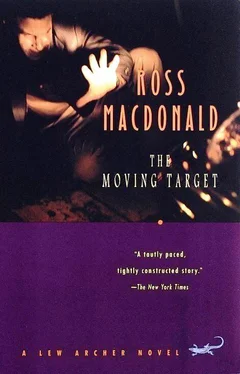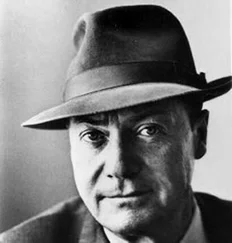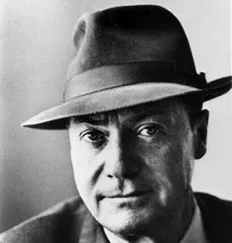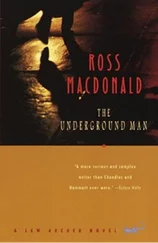No sign of Sampson, and no sign of Graves. I looked at my watch, which said a quarter to seven. It was well over an hour since I’d called Graves. He’d had plenty of time to drive the forty-five miles from Cabrillo Canyon. I wondered what had happened to him and the sheriff.
I shot my flashlight beam across the floor, which was covered with blown sand and the detritus of years. Opposite me was a row of closed doors in a plywood partition. I took a step toward the row of doors. The movement behind me was so lizard-quick I had no time to turn. “Ambush” was the last word that flashed across my consciousness before it faded out.
“Sucker” was the first word when consciousness returned. The cyclops eye of an electric lantern stared down at me like the ghastly eye of conscience. My impulse was to get up and fight. The deep voice of Albert Graves inhibited the impulse: “What happened to you?”
“Turn the lantern away.” Its light went through my eye sockets like swords and out at the back of my skull.
He set the lantern down and kneeled beside me. “Can you get up, Lew?”
“I can get up.” But I stayed where I was on the floor. “You’re late.”
“I had some trouble finding the place in the dark.”
“Where’s the sheriff? Couldn’t you find him either?”
“He was out on a case, committing a paranoiac to the county hospital. I left word for him to follow me down and bring a doctor. I didn’t want to waste time.”
“It looks to me as if you’ve wasted a lot of time.”
“I thought I knew the place, but I must have missed it. I drove on nearly to Buenavista before I realized it. Then when I came back I couldn’t find it.”
“Didn’t you see my car?”
“Where?”
I sat up. A swaying sickness moved back and forth like a pendulum in my head. “At the corner just above here.”
“That’s where I parked. I didn’t see your car.”
I felt for my car keys. They were in my pocket. “You’re sure? They didn’t take my car keys.”
“Your car isn’t there, Lew. Who are they?”
“Betty Fraley and whoever sapped me. There must have been a fourth member of the gang guarding Sampson.” I told him how I had come there.
“It wasn’t smart to leave her in the car,” he said.
“Three sappings in two days are making Jack a dull boy.”
I got to my feet and found that my legs were weak. He offered his shoulder for me to lean on. I leaned against the wall.
He raised the lantern. “Let me look at your head.” The broad planes of his face in the moving light were furrowed by anxiety. He looked heavy and old. “Later,” I said.
I picked up my flashlight and crossed to the row of doors. Sampson was waiting behind the second one, a fat old man slumped on a bench against the rear wall of the cubicle. His head was wedged upright in the corner. His open eyes were suffused with blood.
Graves crowded in behind me and said: “God!” I handed him the flashlight and bent over Sampson. His hands and ankles were bound together with quarter-inch rope, one end of which was strung through a staple in the wall. The other end of the rope was sunk in Sampson’s neck and tied under his left ear in a hard knot. I reached behind the body for one of the bound wrists. It wasn’t cold, but the pulse was gone. The pupils of the red eyeballs were asymmetric. There was something pathetic about the bright plaid socks, yellow and red and green, on the thick dead ankles.
Graves’s breath came out. “Is he dead?”
“Yes.” I felt a terrific letdown, which was followed by inertia. “He must have been alive when I got here. How long was I out?”
“It’s a quarter after seven now.”
“I got here about a quarter to. They’ve had a half-hour’s start. We’ve got to move.”
“And leave Sampson here?”
“Yes. The police will want him this way.”
We left him in the dark. I drew on my last reserve to get up the hill. My car was gone. Graves’s Studebaker was parked at the other side of the intersection.
“Which way?” he said, as he climbed behind the wheel.
“Buenavista. Well go to the highway patrol.”
I looked in my wallet, expecting the locker key to be gone. But it was there, tucked in the card compartment. Whoever sapped me hadn’t had a chance to compare notes with Betty Fraley. Or they decided to make their getaway and let the money go. Somehow that didn’t seem likely.
I said to Graves, as we passed the town limits: “Drop me at the bus station.”
“Why?”
I told him why, and added: “If the money’s there, they may be back for it. If it isn’t, it probably means they came this way and broke open the locker. You go to the highway patrol and pick me up later.”
He let me out at the red curb in front of the bus station. I stood outside the glass door and looked into the big square waiting-room. Three or four men in overalls were slouched on the scarred benches reading newspapers. A few old men, ancient-looking in the fluorescent lights, were leaning against the poster-papered walls and talking among themselves. A Mexican family in one corner, father and mother and several children, formed a solid unit like a six-man football team. The ticket booth under the clock at the back of the room was occupied by a pimply youth in a flowered Hawaiian shirt. There was a doughnut counter to the left, a fat blond woman in uniform behind it. The bank of green metal lockers was against the wall to the right.
None of the people in the room showed the tension I was looking for. They were waiting for ordinary things: supper, a bus, Saturday night, a pension check, or a natural death in bed.
I pushed the glass door open and crossed the butt-strewn floor to the lockers. The number I wanted was stamped on the key: twenty-eight. As I pushed the key into the lock I glanced around the room. The doughnut woman’s boiled blue eyes were watching me incuriously. Nobody else seemed interested.
There was a red canvas beach bag in the locker. When I pulled it out I could hear the rattling paper inside. I sat down on the nearest empty bench and opened the bag. The brown paper package it contained was torn open at one end. I felt the edges of the stiff new bills with my fingers.
I tucked the bag under my arm, went to the doughnut counter, and ordered coffee.
“Did you know you got blood on your shirt?” the blond woman said.
“I know it. I wear it that way.”
She looked me over as if she doubted my ability to pay. I restrained the impulse I had to give her a hundred-dollar bill, and slapped a dime on the counter. She gave me coffee in a thick white cup.
I watched the door as I drank it, holding the cup in my left hand, with my right hand ready to take out my gun. The electric clock above the ticket booth took little bites of time. A bus arrived and departed, shuffling the occupants of the room. The clock chewed very slowly, masticating each minute sixty times. By ten to eight it was too late to hope for them. They had by-passed the money or gone the other way.
Graves appeared in the doorway gesticulating violently. I set down my cup and followed him out. His car was double-parked across the street.
“They just wrecked your car,” he told me, on the sidewalk. “About fifteen miles north of here.”
“Did they get away?”
“Apparently one of them did. The Fraley woman’s dead.”
“What happened to the other?”
“The H. P. don’t know yet. All they had was the first radio report.”
We covered the fifteen miles in less than fifteen minutes. The place was marked by a line of standing cars, a crowd of human figures like animated black cut-outs in the headlights. Graves pulled up short of a policeman who was trying to wave us on with a red-beamed flashlight.
Читать дальше












